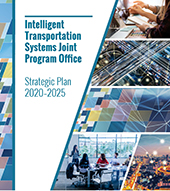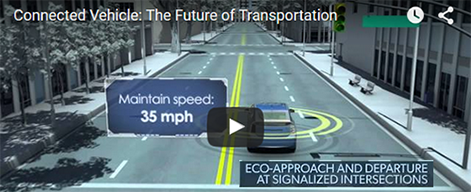
About
The Intelligent Transportations Systems Joint Program Office (ITS JPO)
OUR VISION:
Accelerate the use of ITS to transform the way society moves.
OUR MISSION:
Lead collaborative and innovative research, development, and implementation of ITS to improve the safety and mobility of people and goods.
Planning for the Future of ITS
The ITS Joint Program Office’s 2020-2025 ITS Strategic Plan
About ITS JPO

Current Research
The U.S. Department of Transportation’s ITS research focuses on several high-priority areas including Emerging and Enabling Technologies, Data Access and Exchanges, ITS Cybersecurity Research, Automation, ITS4US, and Accelerating ITS Deployment. The ITS Strategic Plan includes in-depth discussion of the ITS Program’s strategic goals, these research areas, and four technology transfer programs.
Learn more in the 2020-2025 ITS Strategic Plan.
Research Areas

Intelligent Transportation Systems Deployment
| Connected Vehicle Pilots | ||
|
View NYCDOT pilot |
View THEA pilot |
View WYDOT pilot |
ITS Deployment
- ITS4US
- Vehicle-to-Infrastructure Resources
- Connected Vehicle Pilots
- Connected Vehicle News and Events
- Connected Vehicle Deployer Resources
- Connected Vehicle Deployment Assistance
- Connected Vehicle Applications
- Sample Deployment Concepts
- Connected Vehicle Publications
- National ITS Architecture
- Smart City Challenge

Technology Transfer
  |
  |
Technology Transfer

Contact Us

Social Media
Research Archive
- Safety
- Vehicle-to-Vehicle (V2V) Communications for Safety
- Truck V2V Research
- Transit V2V Research
- Connected Vehicle Safety Pilot
- Vehicle-to-Infrastructure (V2I) Communications for Safety
- Truck V2I Research/Smart Roadside
- Transit V2I Research
- Connected Vehicle Safety for Rail
- Vehicle-to-Pedestrian (V2P) Communications for Safety
- Ann Arbor Connected Vehicle Test Environment (AACVTE)
- Mobility
- Environment
- Road Weather
- Policy
- Connected Vehicle Technology
- CV Pilots Deployment Project
- Automated Vehicle
- Intermodal
- Exploratory
- ITS Cross-Cutting Support
- Success Stories
- Clarus
- Commercial Vehicle Information Systems and Networks (CVISN) Core and Expanded Deployment Program
- Congestion Initiative
- Cooperative Intersection Collision Avoidance Systems (CICAS)
- Electronic Freight Management
- Emergency Transportation Operations (ETO)
- Integrated Vehicle-Based Safety Systems (IVBSS)
- Intelligent and Efficient Border Crossings
- Mobility Services for All Americans (MSAA)
- Next-Generation 9-1-1
- Rural Safety Initiative
- Vehicle Infrastructure Integration

Mobility Services for All Americans (MSAA)
Stakeholder Advisory Group
The third level of coalition building reaches out to the Stakeholder Advisory Group beyond public agencies. Stakeholders may include grass-roots, community/advocacy groups, industry organizations, transportation service providers, trade associations, and private businesses. These organizations/individuals have a wide range of interests, expertise, and/or roles in human services transportation and may participate in various capacities, including providing guidance/assistance in coordination, outreach and technology deployment and advising program management and operations. Additionally, expert panels on specific subjects may be formed as needed throughout the course of the program. This initiative directly affects and benefits stakeholders from both human service and transportation communities, including:
- General Public, the Transportation Disadvantaged Individuals in particular
- Public Human Service Transportation Program Offices, including Federal, State, Tribal and Local
- Transportation Disadvantaged Advocates
- National Transportation Organizations
- Public Transit Agencies
- Community and Non-profit Transportation Agencies
- Private Industry, such as Technology Vendors
1200 New Jersey Avenue, SE • Washington, DC 20590 • 800.853.1351




